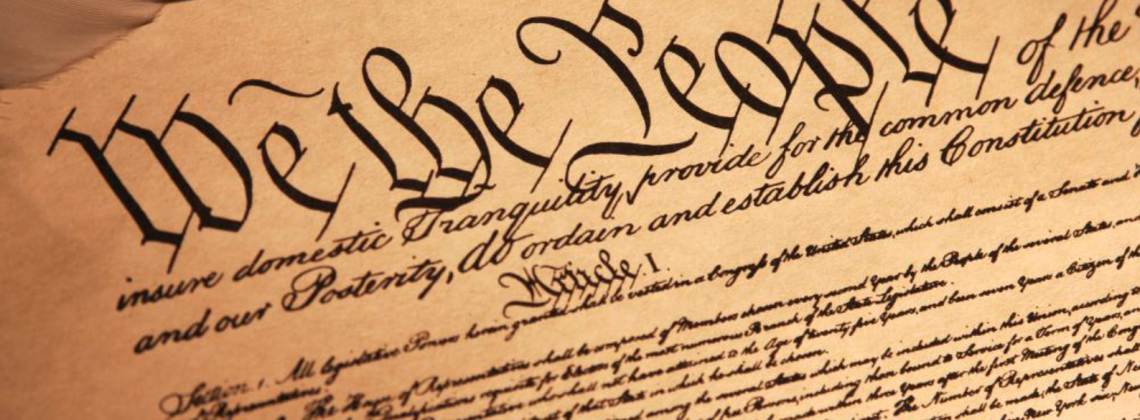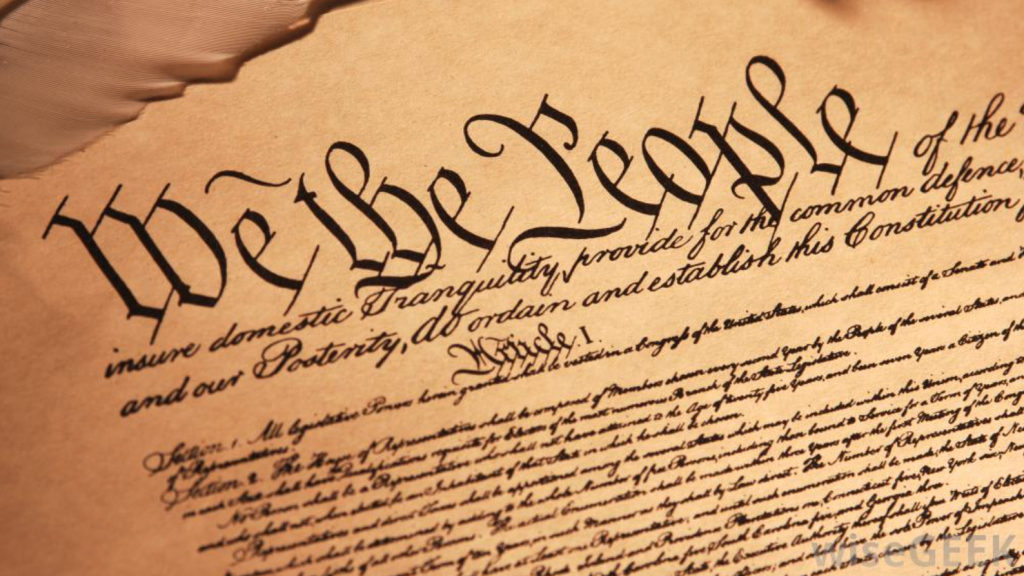

Pass out the critical documents. Watch the students read, discuss, and grow.
We’ve all cringed at the video clips in which Jay Leno stops young Americans on the street to give them a pop quiz in basic civics. In an opinion piece for the October 2023 issue of Reason, Christian Barnard dismisses the clueless responses Leno receives as irrelevant to our civic future. Who cares if your average twenty-year-old cannot name even one of the three branches of government? What matters most for good citizenship, Barnard says, is that students master the skills fundamental to general education: “Civics instruction was condensed partly because schools started devoting more time to reading, science, and math—skills that are far more fundamental to being a good citizen.”
Does Barnard really think democracy can survive if the only Americans who understand the system designed by our Constitution’s framers are those elected to office or hired to fill government posts? Is it enough for citizens merely to apply their skills in reading, writing, computing, and research to the task of choosing how to vote or planning what to say at a public meeting?
I doubt Barnard would make so absurd a claim. Rather, he would sacrifice education in basic American political principles in order to avoid exposing students to something else: the moral dimension of civics education. No subject regularly taught in public school today engages moral questions so frequently and squarely as does social studies—which, to Barnard, is a problem. It leads to disagreement and acrimony:
There are good reasons to . . . doubt that dialing up civics instruction would strengthen democracy. . . . The fact that deeply polarized Americans express bipartisan support for better civics education suggests they are not on the same page about what that should look like in public schools.
But Barnard confuses what happens in classrooms with what happens when adults argue about what happens in classrooms. Few adolescents feel as threatened by moral and political discussions as most adults are.
Yet it’s true that adult Americans do not agree on what better civics education would look like. Some think it would teach young Americans to feel grateful for those who built the country and to celebrate American achievements—what some call “American greatness.” Others think it would teach young Americans to analyze the mistakes of our ancestors so as to repent of American failures before charting a new and better national future.
Neither understanding of civics education captures the real point. Civics begins in the study of human nature. It begins with locating and discussing what’s best and worst in all of us. Only after this discussion can we profitably examine the structure of our constitutional system of separated and balanced powers. It was designed to thwart the many ways free government might turn into tyranny.
James Madison made the point best in Federalist 51. He wrote it to explain how the Constitution’s system of separated and balanced powers gives each branch of government a means of keeping the others from usurping its own authority. He also explained why such a system is needed:
The great security against a gradual concentration of the several powers in the same department, consists in giving to those who administer each department the necessary constitutional means and personal motives to resist encroachments of the others. . . . Ambition must be made to counteract ambition. The interest of the man must be connected with the constitutional rights of the place. It may be a reflection on human nature that such devices should be necessary to control the abuses of government. But what is government itself, but the greatest of all reflections on human nature? If men were angels, no government would be necessary.
Here is one half of the real greatness of the American idea: It is based on what, in the history of political thought, may be the first fully honest assessment of human fallibility—on the part of the rulers as well as the ruled. The other half of the American idea, and of its greatness, is the realization that all of us are created equal.
We know we are all fallible. Yet we cannot see ourselves and others as equals without assuming we share a common moral instinct. When we say we are all created equal, we mean, I think, that we are all endowed with a sense of what is fair and unfair. We know when we are being treated with respect and when we are not. If we think we’re behaving honestly, we feel entitled to other people’s respect and honest dealing.
This is our two-sided American idea: Human beings are flawed and fallible, yet all are granted the dignity of free moral choice. Each of us is endowed with an inner moral barometer to help us exercise that choice. As a consequence, we understand that no one of us has a right to rule over another without the other person’s watchful consent.
How does civics education help students understand human nature and human moral freedom, and how our system of government takes account of both?
Students learn civics best through reading the documents of our history. All students need to study the eloquent statement of principle that is our Declaration of Independence. Afterwards, they must study the practical arrangements that safeguard those principles: the often amended framework of government that is our Constitution. Good teachers guide students through these documents line by line, idea by idea, provision by provision.
Many of the finest teachers I’ve met in my work use primary documents exclusively, in place of government and history textbooks. After the founding documents they assign documents from every subsequent phase of our history. They ask students: To what extent did the founders heirs’—and even the founders themselves—live up to the founders’ principles? To what extent did they forget or abandon these principles?
Students who read what earlier Americans said and wrote don’t need teachers to point out earlier Americans’ mistakes. They spot them on their own, in the evidence the documents provide—just as they sense unfairness when they experience it in their own lives. Nor do they need teachers to point out honesty, bravery, and heroism. They see these, too, in the stories the documents tell.
But by reading and discussing the documents, students trace the many ways citizens fall into error. They examine the pressures that push people off course. Students start to feel empathy for their imperfect ancestors, who acted without foreknowledge of the complications their mistakes would lead to. Talking about the choices of earlier Americans leads them to talk about what Americans choose to do today. Realizing that they, too, lack foreknowledge, they feel a bit uncertain, and listen more attentively to classmates who disagree with them.
Paradoxically, when students study the deep moral questions implicit in civics, they become less likely to see classmates with different political views as bad people. They realize that citizens in every era are prone to confusion, but that talking through our problems helps us sort them out.
We won’t end the acrimony in our politics by removing discussions of civic life from our classrooms. That would forego our best chance of moderating the public debate. We need, rather, to trust the kids to have the conversations we find so difficult. Under the guidance of good teachers, who give them primary documents to read and discuss, the kids may show us the way to a more civil society.
Ellen Tucker works as Communications Editor for Teaching American History. The views expressed here are her own.
This article needs to have a conversation with John’s post at his blog, “What is going on at the University of North Carolina?”